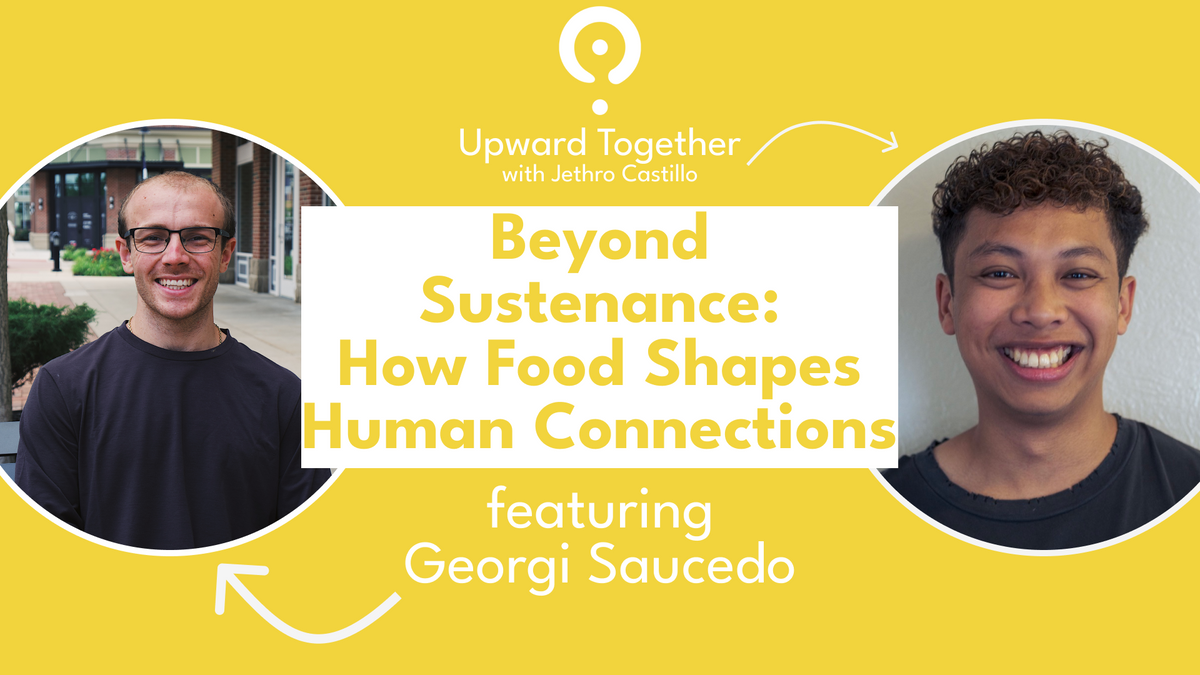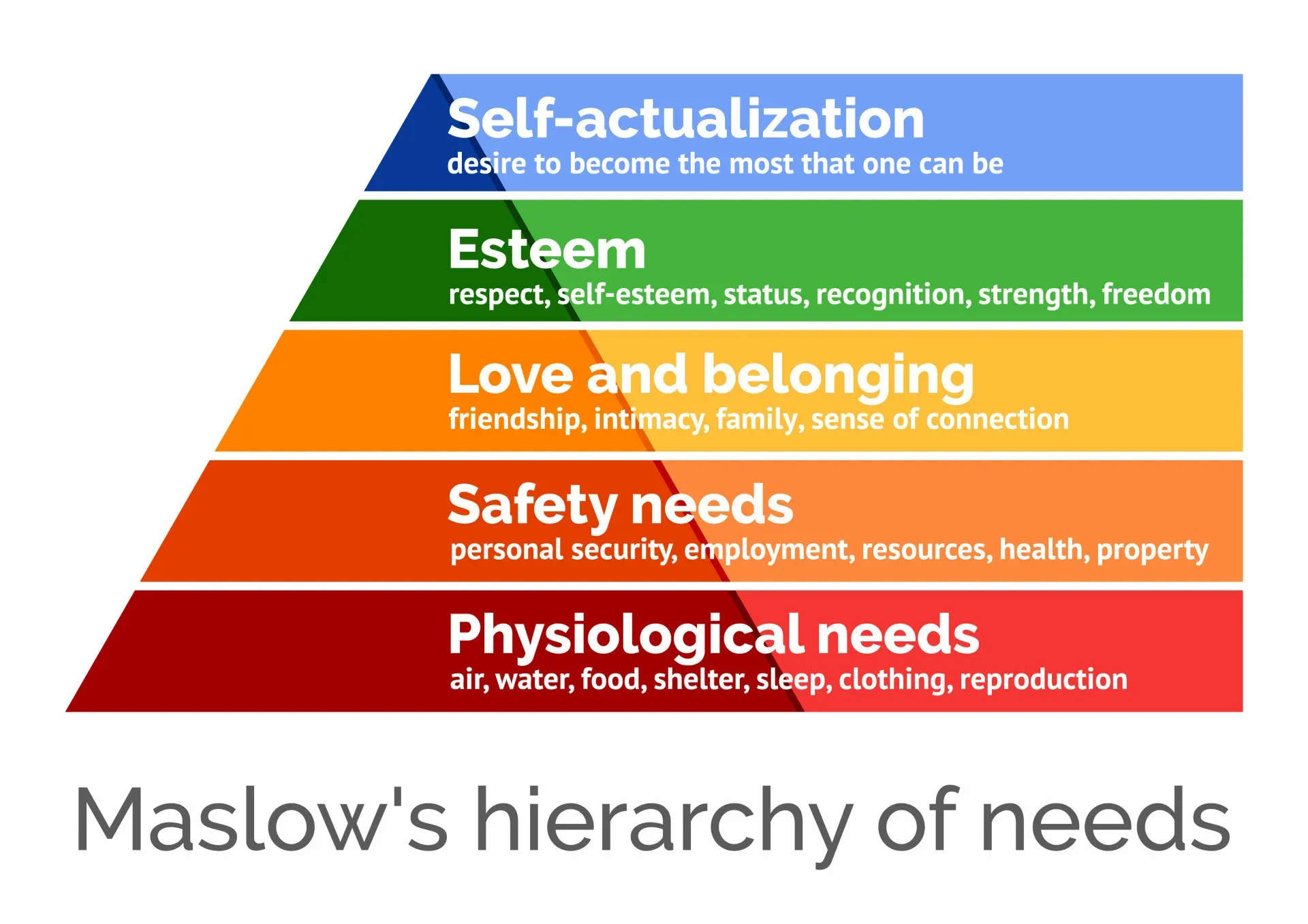Beyond Sustenance: How Food Shapes Human Connections featuring Georgi Saucedo | Upward Together Podcast

On this episode, I had a conversation with Georgi Saucedo, a dear old friend of mine who actually was my co-host on the first podcast I ever did, called Storytime. You can probably still find it wherever you listen to podcasts. We talk about food and the significance it carries in our lives, how it sets the foundation for meaningful interactions and paves the way for enriching connections. My reflection is below.
Like, comment, and subscribe on YouTube!
Before I talk about food, I want to talk about my friendship with Georgi. Georgi and I met at office hours for a general chemistry course in college. Admittedly, I loved that class, and we bonded (hehe) over my ability to help him understand rather difficult concepts. We quickly spent a lot of time together studying for our countless science classes, and before we knew it, the other aspects of our lives started to bleed into our study sessions. That’s a bit of an understatement. We actually ended up studying until 2 or 3 AM many nights, not necessarily because we were cram studying or the material was overwhelming, but because we would spend so much time distracting ourselves and talking about other things.
I would not have traded that time for anything. He became someone I could completely count on and trust with my life. We have had countless vulnerable conversations about ourselves and countless intellectual conversations about the world. He never fails to make me laugh and I know I can turn to him if I need to cry. We both love watching movies at theaters. We both love sports. We both love video games. I celebrated Thanksgiving with his family one year. We visited Amsterdam together when we both studied abroad. Without a doubt, Georgi is one of my favorite people and one of my greatest friends.
We also ate food. Lots of it. Whether it was at the food hall in Amsterdam, the Thanksgiving table at his house, Chick-Fil-A after classes, or midnight snacks while studying, we feasted. I highlight the magnitude of our friendship not just to shower him with praise and express my gratitude for his existence, but to ask the following questions:
Why is it that some of my favorite memories with one of my favorite people revolve around food? What makes food so significant? Georgi’s initial answer was this:
“You feel like you belong and you feel connected and you’re with people you love and food is central to that.”
I don’t disagree. Food is definitely a great way to bring people together. But does food have to be central to that, though? Wouldn’t the experience be the same if we were to sit around the table talking and laughing without the food? The immediate gut reaction answer is ‘no’. But why?
I actually think some of it can be explained with Maslow’s hierarchy of needs. Here is a picture for reference:

Friendship and connection can be found on the third level, love and belonging. The idea of Maslow’s hierarchy of needs is that the levels below must be fulfilled before you can attend to the next level. For example, in order to focus on your safety needs, you first have to make sure your physiological needs are met. For the most part, that makes sense! You have to be alive and breathing and fed and sheltered and well-rested first in order to then focus on feeling financially and personally stable. And I know first-hand how hard it can be to focus on friends and connection when you’re just trying to get your life together.
So a huge reason why food is central to connection and friendship is because we’re addressing a need that is necessary to truly experience love and belonging. When we gather around a dinner table, we ensure that a basic need is met so that we can fully be there for each other. We aren’t thinking about our empty stomach or how parched we are, and as a result, we can be present for the people around us. I really like that idea - caring for each other’s needs so that we can love each other better.
Of course, we can always eat first and then see friends and family. But timing-wise, food and human connection tend to go hand-in-hand. For most of the day, we work. And we work a lot. Sometimes too much. Whether a hunter or gatherer in early human history, or someone who works a 9-5 desk job now, humans have always had to work a lot to survive. When we stop working, a lot of us want to go spend time with friends and family. Funnily enough, this also coincides with the perfect time to eat. Georgi said:
“When you’re not busy with other things and you just want to talk to your tribe, maybe that’s your time to eat.”
Now that I think about it, I should be more intentional about that. I can think of many times that I’ve eaten lunch or dinner while continuing to work, instead of eating dinner with my roommate or calling my dad or mom during lunch. I’ve also realized that when I do take the time to spend time with loved ones, I come back to work much more rejuvenated.
Here I want to highlight a few limitations to Maslow's hierarchy of needs.
- While I submit each level is foundational to really experience the next, the visual of the pyramid doesn't clearly depict how higher levels impact the levels below them. In the case above, it is fulfilling the need for human connection that allows me to pursue my safety needs more joyfully. Eating food with loved ones makes the meal that much richer.
- It doesn't indicate how much we need at one level to then go on to the next. I think some of us treat the second level as the highest level, overworking and overspending, leaving very little time and space to appreciate ourselves and the people around us.
- It implies that love and belonging is merely a stepping stone to esteem and self-actualization and it understates how paramount love is to that which makes us human.
I am the first person in my family born in the United States. My cousins and generations before me were all born in the Philippines. In fact, my nuclear family — my dad, my mom, my brother, and me — is the only family on both my dad and mom’s side to live outside of the Philippines. We get to visit them once every four or five years (in fact, we’re due to visit them soon). I have always wrestled with my good fortune while my cousins have to live in a country with less resources and opportunities. However, whenever we visit, I notice something: they always seem happier than me. Even with less resources, less security, and less access to good health, their lives feel full. Of course, it could just be my perception, but that’s what it looks like. I come to the same conclusion every time — they are happier because even though they may have little, they have each other. While I don’t want it to appear that I am taking for granted my privilege, sometimes I can’t help but feel jealous of my cousins, of the familial love and belonging they get to experience every single day.
Of course, underpinning all of that is food. My cousins and I may experience different luxuries, but they will never fail to make sure that when we eat, we eat good. Whenever I visit, I always come downstairs to a plethora of choices for breakfast every morning, and it is of utmost priority to sit down and eat together as a family for dinner (and there's a lot of us), indulging in a full feast, having good conversation, and doing nothing else but being there with each other.
My extended family has shown me that you don’t have to wait for all your needs to be met to experience love and belonging. They have shown me that despite their living in lack, they live in abundance with each other. Or maybe it's not despite their lack, but because of it - because they have less of material wealth, they are able to have more of each other. They have shown me that above all, love is the most important thing. And core to all of that is being able to sit at the table, enjoy each other's company and eat good food.
Of course, that's not unique to the Philippines. Food is a defining feature of every culture, and in a place like the United States, we have the unique opportunity to experience so many different kinds all at once. Georgi touched on the impact of food in that regard:
“Food should bridge culture…it’s a perfect medium for cross-cultural dialogue.”
He’s absolutely right. In the United States I have had the opportunity to experience and learn about so many different cultures, especially when it comes to food. I am friends of families of different cultures with different traditions and different ways of preparing and consuming food, and sitting at their dinner table provides a space to appreciate and celebrate what makes us unique. Food can help bridge the gap between what makes us different, a necessary step in living less like fragmented groups, and more like one human race.
And finally, the proof is in the pudding (haha had to put a food idiom). To go back to the beginning, food is significant because it is a large part of what makes my friendship with Georgi so special.
Georgi, thank you for you. I appreciate you going upward together with me.
